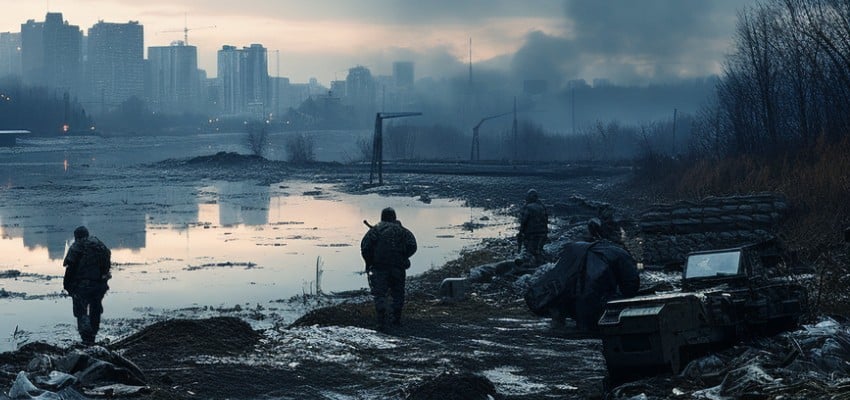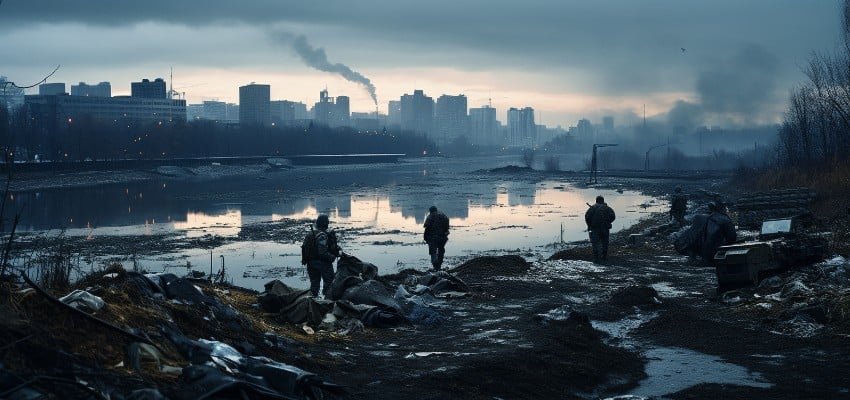|
|
Content Assessment: Critical Shifts Could Alter Conflict's Course (October 31 - November 8, 2023)
Information
Insight
Relevance
Objectivity
Authority
Excellent
A short assessment of the qualitative benefit of the recent synthesis of reporting from the Institute for the Study of War on the Russo-Ukrainian War from October 31 - November 8, 2023.
Source Note: One of the most accurate and detailed sources for ongoing updates on the Ukraine crisis is the Russian Offensive Campaign Assessment from the Institute for the Study of War. The Institute for the Study of War (ISW) is a 501(c)(3) organization and produces strictly non-partisan, non-ideological, fact-based research. ISW seeks to promote an informed understanding of war and military affairs through comprehensive, independent, and accessible open-source research and analysis. ISW’s research is made available to the general public, military practitioners, policymakers, and media members. Providing a daily synthesis of key events related to the Russian aggression against Ukraine, ISW updates may benefit investigators and litigators as they follow the business, information technology, and legal trends and trajectories impacted by and stemming from the current Russo-Ukrainian conflict.
For those seeking to grasp the full scope of this evolving landscape, the complete updates from the Institute for the Study of War serve as an invaluable resource.
Russo-Ukrainian Conflict Update*
Critical Shifts Could Alter Conflict’s Course (October 31 – November 8, 2023)
ComplexDiscovery Staff
Recent Days See Critical Shifts That Could Alter the War’s Trajectory
As the war in Ukraine nears the 20-month mark, recent days have seen critical developments that could shape the conflict’s future course. Both Russia and Ukraine have secured key gains and suffered losses in intense fighting along major frontlines. Significant events include fierce battles near the strategic city of Bakhmut, major strikes across southern Ukraine and Crimea, claims of Russian war crimes, and debates in Moscow on how to boost Russia’s military capabilities. This summary covers the significant events from October 31 to November 8, highlighting the recent evolution of the war that will have enduring impacts in 2023 and beyond.
November 8 – Zelensky Hints at 2024 Plans, Russia Promotes Generals
Ukrainian forces continued counteroffensive operations near Bakhmut and western Zaporizhia as President Zelensky hinted at Ukraine’s 2024 battlefield plans. Select Russian milbloggers claimed commanders may be basing decisions on inaccurate maps. President Putin promoted several military officers, including Eastern Grouping commander Kuzmenko. Putin will reportedly avoid focusing his 2024 re-election campaign on the war, instead emphasizing Russia’s stability and criticizing the West. Ukrainian partisans assassinated a top Luhansk official accused of war crimes. Russian forces conducted attacks along the Kupyansk-Kreminna line, near Bakhmut, Avdiivka, Donetsk City, and Zaporizhia, gaining ground in some areas. Russia is attempting to reacquire military components previously sold abroad to states like Egypt and Pakistan. Russian occupation administrations continued integrating occupied territories into Russia’s governance system.
November 7 – Russia Detains Official as Ukraine Reinforces East Kherson
Russian sources claimed Ukraine transferred armored vehicles and a battalion-sized force to the east bank of Kherson. Ukrainian forces continued counteroffensives near Bakhmut and Zaporizhia. A prominent Russian milblogger called for total economic mobilization, admitting challenges. Russia detained a Dagestani official, likely to show federal control without inflaming tensions. Ukraine significantly damaged a Russian naval vessel in occupied Crimea. Russian forces attacked the Kupyansk-Kreminna line near Bakhmut, Avdiivka, Donetsk City, and Zaporizhia, gaining some ground. Russia is forming a battalion of Ukrainian prisoners of war, likely violating the Geneva Convention. A Russian official promoted aid schemes for children in occupied Ukraine.
November 6 – Debate in Russia Over How to Address Military Challenges
Imprisoned Russian nationalist Girkin argued that Russian offensive capabilities will decline further by spring 2024, given current operations. Russian milbloggers debated how to overcome challenges, responding to a Ukrainian general’s essay on positional warfare. Some advocated for small infantry assault groups, which Ukraine may already use. The war is exacerbating tensions in Russian identity between nationalism and broader cultural definitions. Russia conducted missile and drone strikes in southern Ukraine and record glide bomb strikes in Kherson. Russia has rapidly increased its missile stockpile beyond forecasts. Ukraine continued counteroffensives near Bakhmut and Zaporizhia. Russian forces attacked and advanced along the Kupyansk-Kreminna line near Bakhmut, Avdiivka, Donetsk City, and Zaporizhia. Russia expanded military recruitment in occupied areas, likely supporting forced mobilization. Russia continued weaponizing youth programs for social control.
November 5 – Ukraine Reportedly Steps Up Southern Strikes, Russia Suffers Losses
Ukraine struck a shipyard in occupied Crimea, likely damaging a naval vessel. Ukraine reportedly intensified strikes in southern Ukraine and Crimea. In an interview, President Zelensky said the war is not a stalemate. Ukraine continued offensives near Bakhmut and made gains in Zaporizhia and Kherson. Chechen leader Kadyrov appointed his 15-year-old son to a security position. Dagestan charged riot participants with minor crimes and limited punishments. Russian forces attacked and advanced along the Kupyansk-Kreminna line near Bakhmut, Avdiivka, Donetsk City, and Zaporizhia. A Russian milblogger called for increased propaganda against Ukrainian POWs to boost Russian recruitment. A Russian official promoted the illegal deportation of Ukrainian children.
November 4 – Zelensky Denies Ukraine Is Considering Peace Talks
President Zelensky said the war is not a stalemate, denying reports of Western pressure for peace talks. Zelensky and NBC said Putin shows no willingness to negotiate. A Ukrainian general’s essay explained the need for air power and other aid to regain maneuver. Russia allegedly seized Wagner air defense systems in Syria over weapons transfer claims. Russia conducted missile and drone strikes. Ukraine continued offensives near Bakhmut and Zaporizhia. Russia dismissed a media director for factual war coverage. Russia is testing electronic voting ahead of the 2024 elections. Russian forces advanced along the Kupyansk-Kreminna line near Bakhmut, Avdiivka, Donetsk City, Zaporizhia, and elsewhere. The BBC and Mediazona confirmed over 35,000 Russian military deaths since February 2022. Russia continued settling citizens in occupied Ukraine.
November 3 – Extensive Russian Drone Strikes, Ukraine Calls for More Air Defense
Russia conducted an extensive series of drone strikes across Ukraine. The US announced additional military aid focused on air defense. Ukraine continued offensives near Bakhmut and Zaporizhia. Russian milbloggers criticized keeping skilled commanders at the front instead of training recruits. Putin allies reportedly finance private military companies that subsumed Wagner operations in Africa. Wagner may transfer air defense systems in Syria to Hezbollah. Dagestan threatened punishment for future protests after riots. Kadyrov appealed to Chechen nationalists while supporting Putin. Russian forces advanced along the Kupyansk-Kreminna line near Bakhmut, Avdiivka, Donetsk City, Zaporizhia, and elsewhere. A Russian recruitment campaign offered high salaries for an elite Moscow regiment. A Russian official tried discrediting reports of deporting Ukrainian children.
November 2 – Ukraine Strikes Kherson, Russia Reorganizes Military Leadership
Ukraine struck the Russian headquarters in Kherson. Ukraine advanced near Bakhmut and continued operations in Zaporizhia. Russia had a muted response to a Ukrainian general’s essay. South Korea said North Korea sent Russia over 1 million artillery rounds. Wagner may give air defense systems to Hezbollah. Russia denied absorbing Wagner despite claims. Milbloggers accused Chechen officials of defaming those critical of Wagner’s integration. Russia pursued limited punishment for antisemitic riots in Dagestan. Russian authorities are worried about similar riots elsewhere. Russian forces advanced along the Kupyansk-Kreminna line near Bakhmut, Avdiivka, Donetsk City, Zaporizhia. Irregular Russian forces offered recruits semi-independence from the military. Border restrictions complicated returning deported Ukrainian children.
November 1 – Ukraine Calls for More Aid to Restore Battlefield Maneuver
A Ukrainian general said the war has become positional and offered recommendations to restore maneuver, including securing air power and other aid. Russia seems to be preparing more infantry assaults near Avdiivka, continuing its failure to learn from past offensives. Ukraine continued counteroffensives near Bakhmut and Zaporizhia. Russia’s defense minister echoed Putin’s false narrative of Ukraine’s Kherson activity as a failed counteroffensive. Russia conducted strikes in Poltava and elsewhere. Russia plans to reestablish military district control of ground forces, moving naval assets back under the navy. Reports suggest the son of deceased Wagner financier Prigozhin now leads Wagner under Rosgvardia. Russian forces continued attacks and advanced along the Kupyansk-Kreminna line, near Bakhmut, Avdiivka, Donetsk City, and Zaporizhia.
October 31 – Kadyrov Responds to Dagestan Riots, Fighting Continues
Kadyrov’s response to the Dagestan riots suggests concern about weakening control in Russian regions. Ukraine continued counteroffensives near Bakhmut and Zaporizhia. Russia launched missile and drone strikes. Russia detained suspects for murdering a Ukrainian family in Donetsk. An Uzbek man was reportedly the first sentenced for serving as a Russian mercenary. Russian forces continued attacks and gains near Avdiivka and along the Kupyansk-Kreminna line, Bakhmut, Donetsk City, and Zaporizhia. Former Wagner fighters keep redeploying with other Russian groups. Russian occupation officials continue eradicating the Ukrainian language and culture.
Key Takeaways: Critical Developments That Will Shape the War’s Trajectory
The past week and a half has proven a pivotal period in the war between Russia and Ukraine. Fierce battles near Bakhmut and along the Dnipro River demonstrate Russia’s struggle to advance despite ruthless tactics. Ukraine’s strikes on Russian assets in the south show capabilities to reclaim occupied territory are growing. Meanwhile, Moscow is scrambling to address military shortfalls and dissent amid armed forces casualties nearing 40,000. Ukraine is leveraging recent gains to call for more Western aid to tip the scales further. Though a grim positional war continues, these crucial developments indicate strategic shifts underway that will determine the conflict’s course in 2023.
We do not report in detail on Russian war crimes because those activities are well-covered in Western media and do not directly affect the military operations we are assessing and forecasting. We will continue to evaluate and report on the effects of these criminal activities on the Ukrainian military and population and specifically on combat in Ukrainian urban areas. We utterly condemn these Russian violations of the laws of armed conflict, Geneva Conventions, and humanity even though we do not describe them in these reports.
Detailed Reporting with Maps for October 31 – November 8, 2023, from the ISW – Mouseover to Scroll
Russo-Ukrainian Conflict Update – October 31 to November 8 2023Review the Detailed Reporting and Maps PDF
About the Institute for the Study of War Research Methodology
ISW’s research methodology relies on both primary and secondary sources, enabling researchers to develop a comprehensive understanding of the situation on the ground. In order to analyze military and political developments in any given area, ISW’s research analysts must wholly understand the systems of enemy and friendly forces. They must also understand the population demographics, physical terrain, politics, and history of that area. This lays the analytical foundation for understanding the reasons for particular developments and fulfilling their assigned research objectives. ISW analysts also spend time in places like Iraq, Afghanistan, and elsewhere in order to gain a better understanding of the security and political situation and to evaluate the implementation of current strategies and policies. Our researchers compile data and analyze trends, producing a granular analysis of developments in areas of research, producing an accurate, high-resolution, timely, and thorough picture of the situation. ISW’s research methodology guarantees its success and commitment to improving the nation’s ability to execute military operations, achieve strategic objectives, and respond to emerging problems that may require the use of American military power.
About the Institute for the Study of War
The Institute for the Study of War advances an informed understanding of military affairs through reliable research, trusted analysis, and innovative education. We are committed to improving the nation’s ability to execute military operations and respond to emerging threats in order to achieve U.S. strategic objectives. ISW is a non-partisan, non-profit, public policy research organization.
Learn more, get involved, and contribute today.
Background Information
- Institute for the Study of War (ISW), Russia Team
- Critical Threats Project (CTP), American Enterprise Institute
Additional Reading
- From Dissent to OSINT? Understanding, Influencing, and Protecting Roles, Reputation, and Revenue
- [Annual Update] International Cyber Law in Practice: Interactive Toolkit
- Data Embassies: Sovereignty, Security, and Continuity for Nation-States
Assisted by GAI and LLM Technologies
* Sourced and shared with direct express permission from the Institute for the Study of War (ISW).
Source: ComplexDiscovery





































